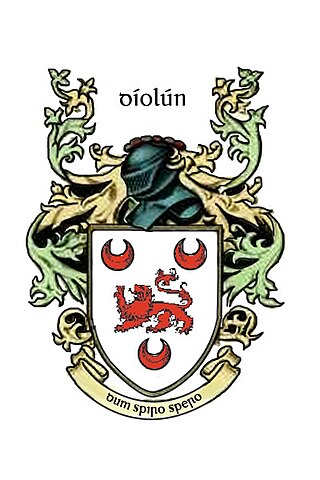Delaney is an Irish surname derived from the Gaelic Ó Dubhshláine, Dubh meaning black and Sláine for the River Sláine (Slaney). DeLaney is also of Norman origin. Variants include Delaney, Delany and Dulaney.
Shanahan is a surname of Irish origin.
Nolan is a surname, of Irish origin from Ó Nualláin, derived from Irish nuall meaning "noble, famous" combined with a diminutive suffix. According to historian C. Thomas Cairney, the O'Nolans in Ireland were one of the chiefly families of the Loígis tribe who in turn came from the Cruthin tribe who were the first Celts to settle in Ireland from between 800 and 500 BC.
MacDonnell, Macdonnell, or McDonnell is a surname of Scottish and Irish origin. It is an anglicized form of the Gaelic patronymic Mac Dhòmhnaill, meaning "son of Dòmhnall". The Gaelic personal name Dòmhnall is a Gaelicised form of the name Donald, which is composed of the elements domno, meaning "world", and val, meaning "might" or "rule". The name is considered a variation of MacDonald.
Stapleton is an English surname dating back to the times of the Anglo-Saxon tribes of Britain. It is a habitation name; examples of habitations are found in Cumbria, Gloucestershire, Herefordshire, Leicestershire, Shropshire, Somerset, and Yorkshire, and the name is derived from the Old English word stapol meaning post and ton meaning settlement.

Dillon is an Irish surname of Breton origin, descending from a cadet branch of Viscomte de Leon in Northern Brittany. It first appeared in Ireland with the arrival of Sir Henry de Leon, in the service of Prince John in 1185. Sir Henry married Maud de Courcy, daughter of Sir John de Courcy and Affrica Guðrøðardóttir. Awarded large tracts of land by in Meath and Westmeath, one of the Dillons’ first Mott & Baileys can still be found at Dunnamona before the establishment of stone structures such as Portlick Castle.
The English-language surname Healy is in use by three separate ancestral lines of people from Ireland.

O'Gorman is a surname. Notable people with the surname include:
Dowling is an Irish surname. It is an anglicised form representing two unrelated clans:
Gleeson is an Irish surname. It is an anglicisation of the Irish name Ó Glasáin or Ó Gliasáin. The name is most common in County Tipperary, but originates in East County Cork, in the once-powerful Uí Liatháin kingdom, where the Gleesons were great lords and sometimes kings.
Coughlan is a surname of Irish origin, meaning 'son of the one with the cloak'. Notable people with the surname include:
Mullally, Mulally, Mullaly or Mulaly are anglicized variants of the Irish language surname Ó Maolalaidh thought to have originated from County Galway where it has since been shortened to the form of Lally.
Durkin is a surname. Notable people with the surname include:
Dwyer is an Irish surname which is a slightly anglicised variation of O'Dwyer. It is said that people with the surname Dwyer and who come from Ireland all come from the same clan.
Spain is a surname of Norman, English and Irish origin. As of 1881, there were 754 bearers of the surname in Great Britain, most of whom were located in Kent; by 2016, the amount in Great Britain had increased to 1050. As of 2010, there were 11,628 people with the surname Spain in the United States.
Hegarty is an Irish surname. Notable people with the surname include:
Ring is a surname of Irish origin, deriving from Ó Rinn. It is also a given name.
Breen is a surname. Notable people with the surname include:
Maher is a surname. It can be derived from the Irish surname Ó Meachair, but is also found in Arabic ("ماهر").
Quinn is an Anglicised form of the Irish Ó Coinn or Mac Cuinn. The latter surname means "descendant of Conn". The surname Quinn is also rendered Ó Cuinn or Mac Cuinn in Irish. The surname is borne by several unrelated families in Ireland, especially in the northern province of Ulster and also the counties of Clare, Longford, and Mayo. According to the historian C. Thomas Cairney, the O'Quins were part of the Conmaicne Rein tribe in Ireland who came from the Erainn tribe who were the second wave of Celts to settle in Ireland from about 500 and 100 BC. The most notable family of the name are that of Thomond, a Dalcassian sept, who derive their surname from Niall Ó Cuinn who was slain at the Battle of Clontarf in 1014. This family was formerly represented by the Earls of Dunraven. Another family is that seated in Annaly, who were related to the O'Farrell lords of Longford. Another Quinn family was seated at An Chraobh, County Tyrone and they were related to the O'Neill Kings of Tír Eoghain and for whom they acted as Hereditary Quartermasters. Other families include one seated in Antrim; one seated in Raphoe; and one called Clann Cuain, seated near Castlebar. In the seventeenth century, the surname Quinn was common in Waterford. In 1890, the surname was numerous in Dublin, Tyrone, Antrim, and Roscommon. Quinn is one of the twenty most common surnames in Ireland. The surname Quinn is sometimes associated with Catholics, while Quin is associated with Protestants.
This page is based on this
Wikipedia article Text is available under the
CC BY-SA 4.0 license; additional terms may apply.
Images, videos and audio are available under their respective licenses.

